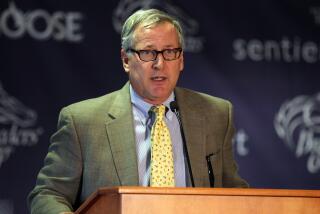A JOB SWITCH FOR ABC’S ARLEDGE
- Share via
In yet another senior executive change since the merger between Capital Cities Communications Inc. and ABC Inc., the company said Monday that Roone Arledge will relinquish day-to-day control over the network’s sports division that he has headed for 22 years.
Arledge, 54, will keep the title of president of ABC News, however, and retain nominal control over sports with the new title of group president of ABC News and Sports.
But, according to the company, Arledge’s only day-to-day role in the sports division will be to serve as executive producer of ABC’s 1988 Winter Olympics coverage and to provide a “creative overview” to the sports operations.
With his new position, Arledge becomes the sixth senior ABC official to leave the network or change jobs since the consummation of its merger with Capital Cities on Jan. 3. In addition, the network’s entertainment division went through major executive changes six weeks before the merger.
Details of Arledge’s job shift were worked out late Friday with John B. Sias, the new president of the ABC division of Capital Cities-ABC Inc., and other corporate executives, a company spokesman said.
One network source said that the move was Arledge’s decision, largely because “sports didn’t interest” him as much as it used to and “news was taking more and more of his time.”
“This new structure gives us the benefit of Roone’s full attention to the news area,” Sias said in a prepared statement.
Arledge was named president of ABC News in 1977, when he became the only network executive to head both news and sports divisions.
Replacing Arledge as president of ABC Sports is Dennis Swanson, a former sportscaster, who has been president of ABC’s broadcast stations division. Before that, he was a producer, news director and station manager at the network’s KABC-TV Channel 7 here and general manager of its station in Chicago.
ABC said that no decision has been reached on a replacement for Swanson, who heads eight television stations and nine radio stations. Another seven radio stations in his division are expected to be sold by May, 1987.
Network sources said that the leading candidates for Swanson’s position appear to be Ken Johnson, general manager of KTRK-TV in Houston, and Lawrence Pollock, vice president and general manager of WPVI-TV in Philadelphia.
Arledge said he has been leaning toward a job move for two years, since the network’s preparations for the 1984 Olympics in Los Angeles.
“It’s kind of a relief in a way,” Arledge said, “because I’ve wanted to do it for a long time. I’ll miss some of that day-to-day contact.”
Sias said that the new management “supported” Arledge’s decision but wanted him to remain in a position to provide a “creative overview” to the sports operation.
Arledge is widely credited as one of the most innovative producers and executives in television. His aggressive pursuit of rights to Olympic Games in the 1960s and ‘70s has been credited with helping to establish ABC as a TV power equal to the other two networks. Arledge also pioneered many of the production techniques now commonplace in TV sports coverage.
“Roone’s expertise and genius in sports are unmatched in this business,” Sias said.
Sias also said Arledge had informed the new management of his desire to concentrate his energies in the news department after the merger.
Nonetheless, the company’s announcement was surprising because senior executives of Capital Cities and ABC were holding a four-day conference in Phoenix as Arledge’s job shift was announced in New York.
Only last Friday, an ABC spokeswoman in New York said that no major management-change announcements were expected to be made during this week’s meeting.
Arledge was not with his fellow executives for the Monday start of the conference, the first such meeting among senior management since the merger.
There also was speculation that problems within both the news and sports divisions made it necessary for Capital Cities-ABC to have full-time management assigned to each operation.
ABC’s evening news show remains third in the network ratings, and all network sports operations have experienced financial difficulties in the past year.
The company disputed a published report that ABC Sports may have lost as much as $40 million in 1985, but corporate officials acknowledged waning advertiser desire to pay for increasingly expensive sports programming on network television.
In an ABC press release, Arledge again said he had considered making the move for the past year and that an important factor was the merger.
“It seemed to me that the appropriate time for a change is now, as the newly merged company determined its senior management structure for the future,” Arledge said.
He started out with the Dumont television network in 1952, and then worked at NBC as a producer. He joined ABC as a sports producer in 1960, becoming vice president for sports in 1963.
Times Staff Writer Jay Sharbutt contributed to this article.
More to Read
The biggest entertainment stories
Get our big stories about Hollywood, film, television, music, arts, culture and more right in your inbox as soon as they publish.
You may occasionally receive promotional content from the Los Angeles Times.










